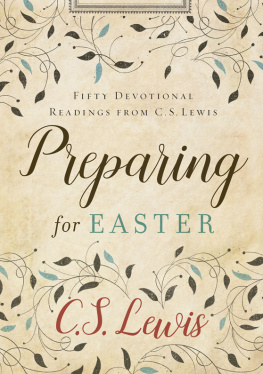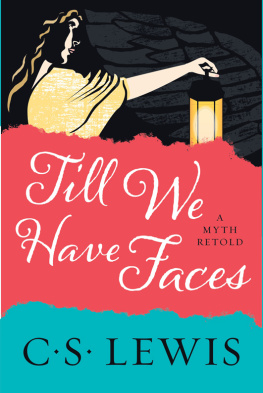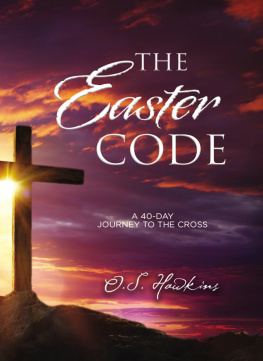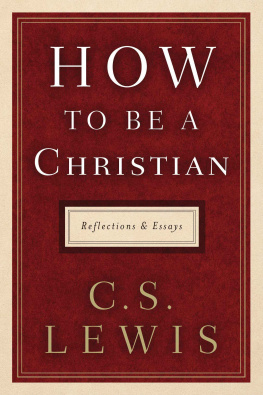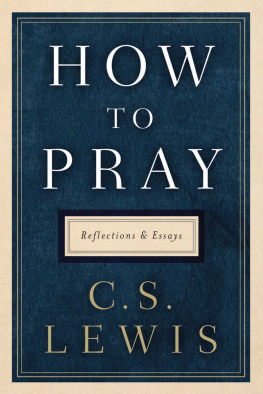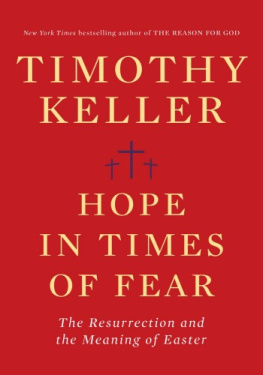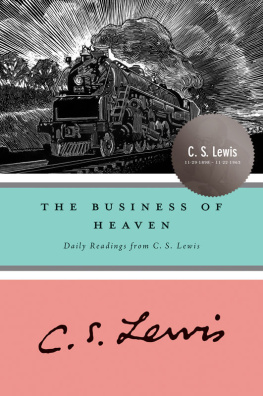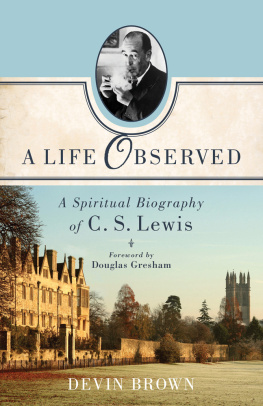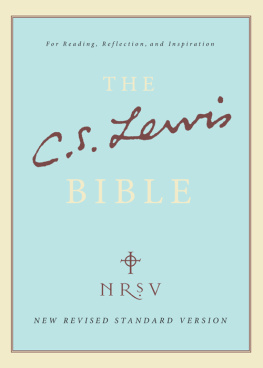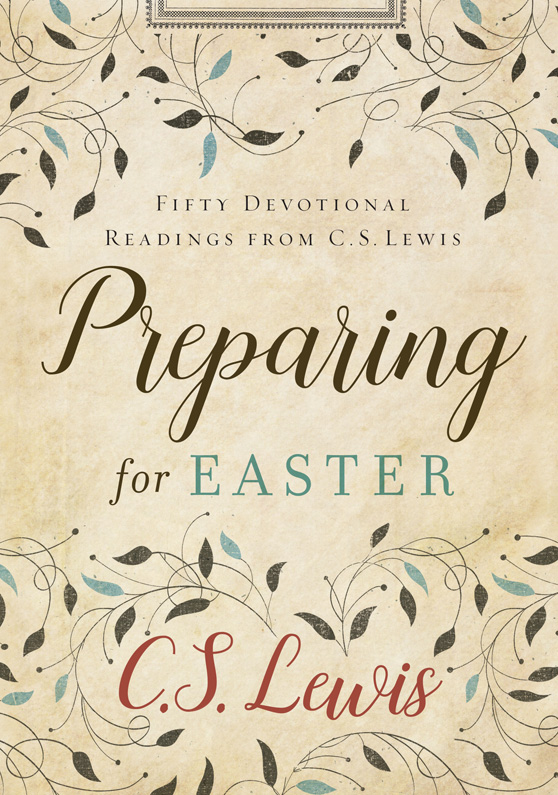People often describe C. S. Lewis as the greatest Christian apologist of the twentieth century. And he clearly deserves such a title, since Lewis provided the groundwork for many thoughtful Christians for why the Christian faith not only remains intellectually credible but also provides the best vantage point for seeing and understanding our world today. This is certainly one of the main reasons for explaining the very strange phenomenon of an author selling many more copies of such works as Mere Christianity, The Screwtape Letters, The Great Divorce, and The Four Loves today than during the authors own lifetime. Since HarperCollins, Lewiss publisher in both the United States and the United Kingdom, is celebrating its two-hundredth anniversary in 2017, we can say very confidently that Lewiss growing and continued popularity is very rare indeed.
But being a leading Christian defender of the faith would not be the only reason to explain Lewiss posthumous popularity. Like Lewiss contemporary, Dietrich Bonhoeffer, Lewis was also a pioneering explainer of the Christian life itself. In fact, I believe that Lewiss apologetics are so powerful precisely because many find his vision of the Christian life so compelling and inspiring.
It is this latter role of Lewiss, as a visionary prophet for how to follow Christ today, that this collection is concerned with. In many Christian traditions, the period before Easter is seen as a time of spiritual preparation for the day we later celebrate and welcome the grand miracle Christ accomplished through the cross. In these anticipatory days, often called Lent, many Christians choose the spiritual discipline of reading a devotional work each morning to help keep their focus on God. In Preparing for Easter, we have put together fifty readings from a broad swath of Lewiss works, many of which come from books and essays that few people encounter but which still embody Lewiss characteristic wisdom, for just this purpose.
The selections come to us from the skilled editorial eye of Zachry Kincaid, the Lewis expert who edits the popular blog on our website CSLewis.com. We hope you enjoy these selections and that they help you, as Lewis would say, go further up and further in to the world God invites us to enter.
MICHAEL G. MAUDLIN
Scripture Readings
Matthew 11:2730
Psalm 90:16
Every Christian would agree that a mans spiritual health is exactly proportional to his love for God. But mans love for God, from the very nature of the case, must always be very largely, and must often be entirely, a Need-love. This is obvious when we implore forgiveness for our sins or support in our tribulations. But in the long run it is perhaps even more apparent in our growingfor it ought to be growingawareness that our whole being by its very nature is one vast need; incomplete, preparatory, empty yet cluttered, crying out for Him who can untie things that are now knotted together and tie up things that are still dangling loose. I do not say that man can never bring to God anything at all but sheer Need-love. Exalted souls may tell us of a reach beyond that. But they would also, I think, be the first to tell us that those heights would cease to be true Graces, would become Neo-Platonic or finally diabolical illusions, the moment a man dared to think that he could live on them and henceforth drop out the element of need. The highest, says the Imitation, does not stand without the lowest. It would be a bold and silly creature that came before its Creator with the boast Im no beggar. I love you disinterestedly. Those who come nearest to a Gift-love for God will next moment, even at the very same moment, be beating their breasts with the publican and laying their indigence before the only real Giver. And God will have it so. He addresses our Need-love: Come unto me all ye that travail and are heavy-laden, or, in the Old Testament, Open your mouth wide and I will fill it. Thus one Need-love, the greatest of all, either coincides with or at least makes a main ingredient in mans highest, healthiest, and most realistic spiritual condition. A very strange corollary follows. Man approaches God most nearly when he is in one sense least like God. For what can be more unlike than fullness and need, sovereignty and humility, righteousness and penitence, limitless power and a cry for help? This paradox staggered me when I first ran into it; it also wrecked all my previous attempts to write about love. When we face it, something like this seems to result.
We must distinguish two things which might both possibly be called nearness to God. One is likeness to God. God has impressed some sort of likeness to Himself, I suppose, in all that He has made. Space and time, in their own fashion, mirror His greatness; all life, His fecundity; animal life, His activity. Man has a more important likeness than these by being rational. Angels, we believe, have likenesses which Man lacks: immortality and intuitive knowledge. In that way all men, whether good or bad, all angels including those that fell, are more like God than the animals are. Their natures are in this sense nearer to the Divine Nature. But, secondly, there is what we may call nearness of approach. If this is what we mean, the states in which a man is nearest to God are those in which he is most surely and swiftly approaching his final union with God, vision of God, and enjoyment of God. And as soon as we distinguish nearness-by-likeness and nearness-of-approach, we see that they do not necessarily coincide. They may or may not.
Perhaps an analogy may help. Let us suppose that we are doing a mountain walk to the village which is our home. At mid-day we come to the top of a cliff where we are, in space, very near it because it is just below us. We could drop a stone into it. But as we are no cragsmen we cant get down. We must go a long way round; five miles, maybe. At many points during that dtour we shall, statically, be far further from the village than we were when we sat above the cliff. But only statically. In terms of progress we shall be far nearer our baths and teas.
Since God is blessed, omnipotent, sovereign, and creative, there is obviously a sense in which happiness, strength, freedom, and fertility (whether of mind or body), wherever they appear in human life, constitute likenesses, and in that way proximities, to God. But no one supposes that the possession of these gifts has any necessary connection with our sanctification. No kind of riches is a passport to the Kingdom of Heaven.
At the cliffs top we are near the village, but however long we sit there we shall never be any nearer to our bath and our tea. So here the likeness, and in that sense nearness, to Himself which God has conferred upon certain creatures and certain states of those creatures is something finished, built in. What is near Him by likeness is never, by that fact alone, going to be any nearer. But nearness of approach is, by definition, increasing nearness. And whereas the likeness is given to usand can be received with or without thanks, can be used or abusedthe approach, however initiated and supported by Grace, is something we must do. Creatures are made in their varying ways images of God without their own collaboration or even consent. It is not so that they become sons of God. And the likeness they receive by sonship is not that of images or portraits. It is in one way more than likeness, for it is unison or unity with God in will; but this is consistent with all the differences we have been considering. Hence, as a better writer has said, our imitation of God in this lifethat is, our willed imitation as distinct from any of the likenesses which He has impressed upon our natures or statesmust be an imitation of God incarnate: our model is the Jesus, not only of Calvary, but of the workshop, the roads, the crowds, the clamorous demands and surly oppositions, the lack of all peace and privacy, the interruptions. For this, so strangely unlike anything we can attribute to the Divine life in itself, is apparently not only like, but is, the Divine life operating under human conditions.

